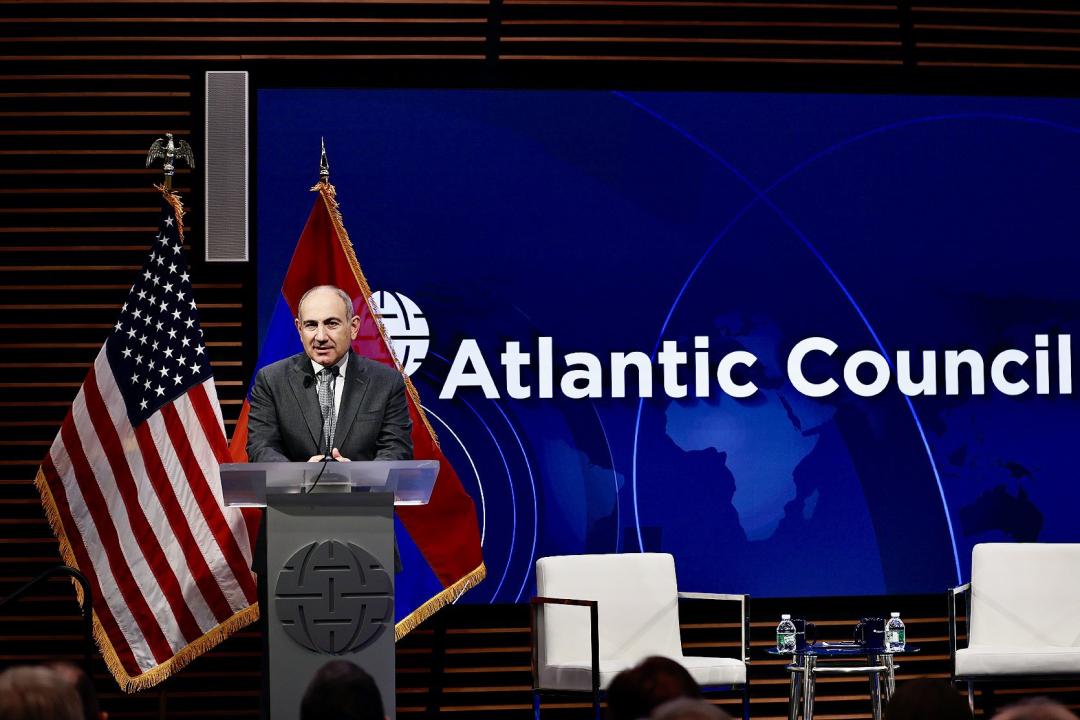
Pashinyan Discusses Armenia-Turkey Relations and Peace Talks with Azerbaijan

On February 5, during a speech at the Atlantic Council, Armenian Prime Minister Nikol Pashinyan outlined his government's balanced foreign policy, emphasizing Armenia's pursuit of regional peace, sovereignty, and international cooperation.
Pashinyan, the Prime Minister of Armenia, began by discussing the core of Armenia's foreign policy, which aims to increase the country's independence and sovereignty through diversification. He stated that the policy's essence is moving from dependence on a few countries to broader, more diverse relationships. This approach, he noted, particularly focuses on regional relations, which directly impact Armenia's independence and security. Pashinyan highlighted the country's ongoing efforts to engage with neighbors despite two closed borders with Turkey and Azerbaijan. He stressed Armenia's constructive relations with Georgia and Iran while also aiming to foster improved ties with Azerbaijan and Turkey.
Pashinyan detailed the ongoing peace process with Azerbaijan, emphasizing Armenia's progress on the draft peace treaty. According to him, Armenia and Azerbaijan had reached agreements on 15 of 17 points, with only two still unresolved. He expressed hope for the completion of the treaty soon, with international support being essential for creating a conducive environment for lasting peace. Furthermore, Pashinyan shared that Armenia's diplomatic relations with Turkey were growing, pointing to his multiple meetings with the Turkish President, including a significant agreement to open borders for third-country nationals and diplomatic passport holders.
In addition to regional diplomacy, Pashinyan discussed Armenia's broader foreign policy diversification, particularly its growing cooperation with the European Union and its ongoing membership in the Eurasian Economic Union. He noted the suspension of Armenia’s participation in the Collective Security Treaty Organization (CSTO) due to unmet security guarantees. Regarding Armenia's EU ties, Pashinyan highlighted the European Union's involvement in Armenia's security for the first time through a civilian observer mission deployed on the Armenia-Azerbaijan border.
Pashinyan also addressed Armenia's relationship with the United States, citing the signing of a charter on strategic cooperation. He emphasized Armenia's commitment to a balanced foreign policy and the European Union's inclusion of Armenia in the European Peace Facility as an important milestone. Despite facing various international challenges, Pashinyan expressed optimism about Armenia's growing independence and sovereignty, noting that these advancements open new opportunities and challenges for the country.
In his remarks, Pashinyan outlined the importance of democracy for Armenia's foreign policy, suggesting that democratic reforms strengthen relations with other democratic nations. He also acknowledged that while democracy presents challenges, it offers significant opportunities for Armenia's development, security, and prosperity.
Reflecting on the peace process with Azerbaijan, Pashinyan stressed that peace is the only reliable instrument for Armenia's security and prosperity. He acknowledged the public’s historical skepticism but urged for active engagement in the peace agenda. Pashinyan revealed that the unresolved points in the peace treaty involve the deployment of a third force along the Armenia-Azerbaijan border and the withdrawal of legal complaints from both parties. He expressed hope that the completion of the peace treaty would mark the beginning of a new era in bilateral relations.
On Turkey, Pashinyan noted that Armenia and Turkey are engaged in an active dialogue, unprecedented in their history. Despite some nuances, Pashinyan emphasized that the ongoing communication between foreign ministers and representatives could soon lead to tangible results. He concluded by reaffirming Armenia's commitment to peace and international cooperation, expressing hope that political will would finalize the peace process with Azerbaijan.
See Also


Mirzoyan Meets US Deputy Assistant Secretary Joshua Huck

Azerbaijani President Holds Talks with UAE and German Business Delegations on Economic Cooperation

Grigoryan Confirms Armenia’s Readiness to Dissolve OSCE Minsk Group Upon Peace Treaty Signing

Azerbaijani Official Warns of Ecological Risks to Caspian Sea, Similar to Lake Urmia and Aral Sea

